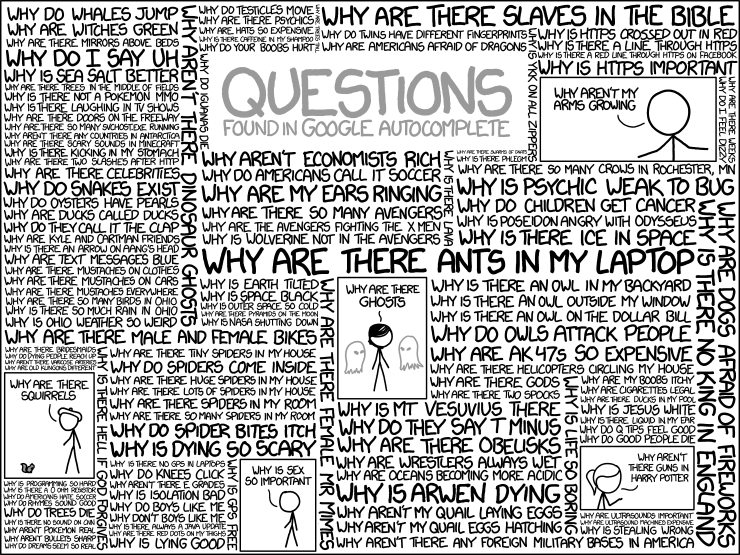I invite you to ask anything you’re wondering about that’s remotely related to effective altruism. There’s no such thing as a question too basic.
Try to ask your first batch of questions by Monday, October 17 (so that people who want to answer questions can know to make some time around then).
Everyone is encouraged to answer (see more on this below). There’s a small prize for questions and answers. [Edit: prize-winning questions and answers are announced here.]
This is a test thread — we might try variations on it later.[1]
How to ask questions
Ask anything you’re wondering about that has anything to do with effective altruism.
More guidelines:
- Try to post each question as a separate "Answer"-style comment on the post.
- There’s no such thing as a question too basic (or too niche!).
- Follow the Forum norms.[2]
I encourage everyone to view asking questions that you think might be “too basic” as a public service; if you’re wondering about something, others might, too.
Example questions
- I’m confused about Bayesianism; does anyone have a good explainer?
- Is everyone in EA a utilitarian?
- Why would we care about neglectedness?
- Why do people work on farmed animal welfare specifically vs just working on animal welfare?
- Is EA an organization?
- How do people justify working on things that will happen in the future when there’s suffering happening today?
- Why do people think that forecasting or prediction markets work? (Or, do they?)
How to answer questions
Anyone can answer questions, and there can (and should) be multiple answers to many of the questions. I encourage you to point people to relevant resources — you don’t have to write everything from scratch!
Norms and guides:
- Be generous and welcoming (no patronizing).
- Honestly share your uncertainty about your answer.
- Feel free to give partial answers or point people to relevant resources if you can’t or don’t have time to give a full answer.
- Don’t represent your answer as an official answer on behalf of effective altruism.
- Keep to the Forum norms.
You should feel free and welcome to vote on the answers (upvote the ones you like!). You can also give answers to questions that already have an answer, or reply to existing answers, especially if you disagree.
The (small) prize
This isn’t a competition, but just to help kick-start this thing (and to celebrate excellent discussion at the end), the Forum team will award $100 each to my 5 favorite questions, and $100 each to my 5 favorite answers (questions posted before Monday, October 17, answers posted before October 24).
I’ll post a comment on this post with the results, and edit the post itself to list the winners. [Edit: prize-winning questions and answers are announced here.]

- ^
Your feedback is very welcome! We’re considering trying out themed versions in the future; e.g. “Ask anything about cause prioritization” or “Ask anything about AI safety.”
We’re hoping this thread will help get clarity and good answers, counter some impostor syndrome that exists in the community (see 1 and 2), potentially rediscover some good resources, and generally make us collectively more willing to ask about things that confuse us.
- ^
If I think something is rude or otherwise norm-breaking, I’ll delete it.

One recent paper suggests that an estimated additional $200–328 billion per year is required for the various measures of primary care and public health interventions from 2020 to 2030 in 67 low-income and middle-income countries and this will save 60 million lives. But if you look at just the amount needed in low-income countries for health care - $396B - and divide by the total 16.2 million deaths averted by that, it suggests an average cost-effectiveness of ~$25k/death averted.
Other global health interventions can be similarly or more effective: a 2014 Lancet article estimates that, in low-income countries, it costs $4,205 to avert a death through extra spending on health[22]. Another analysis suggests that this trend will continue and from 2015-2030 additional spending in low-income countries will avert a death for $4,000-11,000[23].
For comparison, in high-income countries, the governments spend $6.4 million to prevent a death (a measure called “value of a statistical life”)[24]. This is not surprising given the poorest countries spend less than $100 per person per year on health on average, while high-income countries almost spend $10,000 per person per year[25].
Giv... (read more)
I wrote a post about this 7 years ago! Still roughly valid.
Could you post this as a new forum post rather than a link to a Google doc? I think it's a question that gets asked a lot and would be good to have an easy to read post to link to.
This is a great question, and the same should be asked of governments (as in: "why doesn't the UK aid budget simply all go to mosquito nets?")
A likely explanation for why the Gates Foundation doesn't give to GiveWell's top charities is that those charities don't currently have much room for more funding (GiveWell had to rollover funding last year because they couldn't spend it all. A recent blog posts suggests they may have more room for funding soon https://blog.givewell.org/2022/07/05/update-on-givewells-funding-projections/)
A likely explanation for why ... (read more)